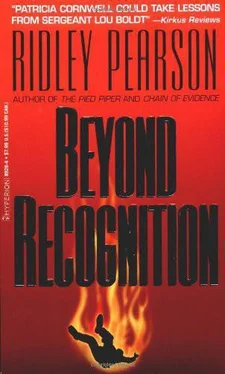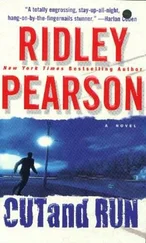Ridley Pearson - Beyond Recognition
Здесь есть возможность читать онлайн «Ridley Pearson - Beyond Recognition» весь текст электронной книги совершенно бесплатно (целиком полную версию без сокращений). В некоторых случаях можно слушать аудио, скачать через торрент в формате fb2 и присутствует краткое содержание. Жанр: Триллер, на английском языке. Описание произведения, (предисловие) а так же отзывы посетителей доступны на портале библиотеки ЛибКат.
- Название:Beyond Recognition
- Автор:
- Жанр:
- Год:неизвестен
- ISBN:нет данных
- Рейтинг книги:5 / 5. Голосов: 1
-
Избранное:Добавить в избранное
- Отзывы:
-
Ваша оценка:
- 100
- 1
- 2
- 3
- 4
- 5
Beyond Recognition: краткое содержание, описание и аннотация
Предлагаем к чтению аннотацию, описание, краткое содержание или предисловие (зависит от того, что написал сам автор книги «Beyond Recognition»). Если вы не нашли необходимую информацию о книге — напишите в комментариях, мы постараемся отыскать её.
Beyond Recognition — читать онлайн бесплатно полную книгу (весь текст) целиком
Ниже представлен текст книги, разбитый по страницам. Система сохранения места последней прочитанной страницы, позволяет с удобством читать онлайн бесплатно книгу «Beyond Recognition», без необходимости каждый раз заново искать на чём Вы остановились. Поставьте закладку, и сможете в любой момент перейти на страницу, на которой закончили чтение.
Интервал:
Закладка:
“Knock, knock,” he said, toeing open the bathroom door, trying to release the vise of her grip on his hair.
Liz’s face was bright red, her chest flushed, her body stretched in the tub and magnified by the water. She looked so incredibly appealing, the florid skin tones of a Rubens. He felt a pang of protective jealousy. There was no such thing as ownership; he knew this consciously, and yet …
“I think it’s dinnertime,” he said, his voice cracking, emotions and memories welling up from within him. She had betrayed his faith once before; was it so impossible again? Many of the same elements were in place: both of them working too hard, ignoring the other’s needs. The two kids placed impossible burdens on their attentions. There was little time left for their marriage. It was all about the family now. It was different.
He didn’t want to cry in front of her, to set her off, to start something he felt so unclear about, so incapable of articulating. He wanted to treasure her, to trust her, to believe. He feared the truth; he didn’t want to know-and the realization swept through him that this was the first time he had purposely and intentionally not wanted the truth. As an investigator, curiosity drove him, fed him. It was the fuel of his professional existence, and yet now he stifled it, like throwing a wet blanket over a fire. To him this was a profound and significant difference, and one he interpreted as a weakness. A crack in the armor.
The mother beckoned with outstretched arms, and the child, seeing this, stopped crying and wiggled to be free. Boldt envied Liz this biological connection and for a moment felt himself a visitor in his own home. Liz sat up high in the tub and, cradling the child, offered her ripened breast. The hungry lips drew her mother into her and Liz smiled slightly, closed her eyes, and leaned her head back against the tub. Boldt studied his wife’s nakedness from head to toe, her youthful breasts, trim waist, the grassy swatch of black hair between her long legs. He didn’t want anyone else having this. He felt possessive. He wondered why he had allowed his own body to train-wreck the way it had. He blamed himself.
“Didn’t I hear your pager?” she questioned, her eyes still closed.
Did she want him out of the house? He felt a flood of anger surge through him. He stood taller and drew his stomach a little tighter. He suddenly wished he looked different, less disheveled, more hair, better tone to his muscles. Had her eye wandered? Was he aging too quickly for her?
“Yeah,” he answered. Was she going to blame the pager for awakening Sarah? It wouldn’t be the first time. She had fallen into the habit recently of blaming him for all sorts of things, many out of his control. He had let most of these complaints pass unchallenged, but they had eaten into him like dry rot, damage unseen to the naked eye.
“You going to call it in?” she asked. The lines of her naked form were a work of art. He wished the tub were big enough for both of them. He wanted to feel her skin against his, warm and wet.
“Yeah.” When had he not called it in? he wondered. He was a slave to his work. He lived for it.
She opened her eyes slightly, like a person drugged-dreamy and quiet. The baby suckled her. Again he was struck by how he envied that connection. He wondered what it must feel like to her, the aching swelling of the breast relieved, her fluids giving life to another. “You okay?” she asked, her brow knitted sharply, her eyes suddenly pained.
“Sure,” he replied.
“I don’t think so.”
“Fine,” he lied to her, wondering when and how that had become such an easy thing to do.
“You know what it is?” she asked. He looked back at her curiously, wondering if this was to be her moment of confession. Strangely, he didn’t want that just now. “The pager,” she explained. “Do you know what it’s about?”
“No, it’s not that,” he informed her.
“Then what?”
“Regrets. Concerns.” He heard his voice betray him. Betrayal fed on itself, he thought, like those insects that eat their mates.
Her eyes came open wider. Her hips rolled in the water as she leaned toward him. She floated there, motionless. She cradled the baby tighter to her. “Honey?”
He had an urge to make love to her. Possess her. He knew it was for all the wrong reasons. “Maybe we should talk at some point,” he said, though he sounded defeated and he knew she picked up on it.
“I’m all yours,” she said.
I wonder, Lou Boldt thought. He nodded, though insincerely. She took the baths to clean herself up, to keep him from knowing. A cleansing. Purify her from whoever else had been with her. He ached, wondering what drove such thoughts.
“Go to work, Sergeant,” she ordered. “I’m not going to get mad about it.”
“I’ll call in,” he said. “Check it out.”
“I’ll wait up,” she told him, acknowledging with more certainty than he wished that the page was going to take him from their home. She was right, of course, it nearly always did. The pager was the giant stage hook, designed, it seemed, to steal him from his home life. To disrupt. He had come to hate it. “Or I’ll try to, depending how late you are.” She chuckled. The baby lost her mother’s nipple, and Liz helped her to find it again.
“You two are beautiful,” he said, still living with the urge to have her sexually. He felt his throat choke and turned toward the phone to prevent her from seeing the betrayal of tears that filled his eyes.
Out of the frying pan and into the fire, Boldt thought, the wind blowing through his close-cropped hair-what was left of it; her silhouette caught by a streetlamp that lit the running path that surrounded Green Lake. Daphne Matthews was a little too fit, a little too pretty; she never quite looked the part.
The lake was several acres of black water surrounded by the running path, a perimeter road lined on the east with cafes and a quality restaurant or two. Lush wooded hills, densely populated with neighborhoods of two- and three-story clapboard houses built in the city’s first big boom-the timber era-seventy years earlier, rose on three sides, containing the lake in a jeweled bowl of window lights. Green Lake was picturesque and charming, like something from a New England village postcard. South of the lake were recreation fields for softball and soccer, lit at night by steel towers projecting a harsh, stark light visible at a great distance. At 8 P.M. the lake’s running path still saw a great deal of use, men and women running or walking alone for the most part, as contrasted with the pairs of couples and friends and associates that exercised in the early morning and at lunchtime.
Daphne wore jeans and a stone-washed blue silk jacket over a crisp white shirt buttoned to her neck. He joined her and they started walking, holding to the right side of the path, allowing the breathless joggers to pass. The lake was convenient to both their houses. She had recommended they meet there, as they had so many times before.
“Emily Richland uses a shill who checks the cars of her clients. Information about the cars is passed to her, and she can make some damn good educated guesses as to who is sitting in front of her.”
“Am I supposed to be surprised?” he asked, his mind elsewhere.
“The guy with the burned hand came to her place looking to check a couple of dates: October second, two days before Heifitz; and then again on Saturday. Lou, I think it’s the arsonist.” Before he could speak, she said, “His right hand-the last three fingers are fused in a kind of paddle. Badly burned. He’s military. Air Force, maybe. I think she’s holding out on me. I think she has more.”
Boldt’s mind raced away from him, removing his concern about Liz’s affair and focusing solely on the suspect. He realized that he buried himself in work for a reason. “His car?”
Читать дальшеИнтервал:
Закладка:
Похожие книги на «Beyond Recognition»
Представляем Вашему вниманию похожие книги на «Beyond Recognition» списком для выбора. Мы отобрали схожую по названию и смыслу литературу в надежде предоставить читателям больше вариантов отыскать новые, интересные, ещё непрочитанные произведения.
Обсуждение, отзывы о книге «Beyond Recognition» и просто собственные мнения читателей. Оставьте ваши комментарии, напишите, что Вы думаете о произведении, его смысле или главных героях. Укажите что конкретно понравилось, а что нет, и почему Вы так считаете.












